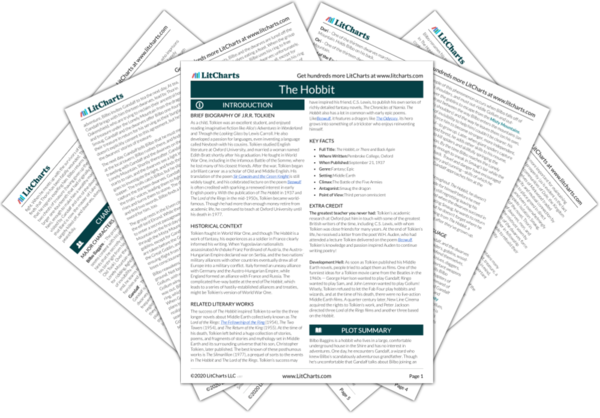Summary
Analysis
On May 1st, Bilbo and Gandalf pass through Rivendell, where the elves sing songs of Smaug’s defeat and the dwarves’ victory. Gandalf tells Elrond of the group’s adventures – Bilbo is largely too tired to explain. Bilbo learns that while Gandalf was away from his quest with the dwarves, the wizard was driving the mysterious Necromancer from his home near Mirkwood; thus, the forest and much of the surrounding area will be safer in the future.
At every stage of The Hobbit, song and poetry marks the major events of the dwarves’ quest. Bilbo has participated in an important adventure, and this means that he will be remembered long after his death, in the songs of the dwarves and the elves—he too has been written into history. Another mark of the importance of the group’s quest is that the journey home is relatively safe and easy—many evil foes have been defeated. It’s a mark of Tolkien’s imagination that he doesn’t fully—or even partially—explain who the Necromancer is: Middle Earth is a vast world, only a fraction of which is explained in The Hobbit (this world, including the Necromancer, is much further developed in Tolkien’s subsequent Lord of the Rings trilogy).
Themes
As Gandalf and Bilbo get closer to hobbit-town, Bilbo remembers his adventures, which seem to have occurred a decade ago, though it’s been only a year since he left his home. He and Gandalf come upon the treasure that belonged to the three trolls. Though at first he offers the treasure to Gandalf, he eventually takes some of it for himself when Gandalf reminds him that he may need it someday.
Bilbo remembers his adventures having begun long ago because he has changed enormously in the last year—he’s become more resourceful, braver, etc. At the same time, Bilbo doesn’t seem much more interested in treasure or gold than he was at the beginning of the book. This suggests that the real value of his quest wasn’t in the treasure chests he brought back with him, but rather in the personal change he experienced as a result of participating in it.
Themes
When Bilbo arrives in hobbit-town, he is surprised to learn that he has been presumed dead, and the other hobbits have been raiding his house and taking his possessions. Even after Bilbo returns, some of his possessions remain missing, and some people, such as his relatives, the Sackville-Bagginses, say that he is an imposter. Among the hobbits, Bilbo has gained a damaging reputation for being adventurous and a friend to the elves, but he does not mind. He enjoys his life in his hobbit-hole even more than he did before he met Gandalf. He rarely uses his sword or ring, and donates his mail coat to a museum.
With Bilbo’s return to hobbit-town, he “rises from the dead,” since his neighbors had thought he was deceased. This is strangely appropriate, since Bilbo has indeed been “reborn” in the last year—his personality and character has changed. The greed of Bilbo’s neighbors shows that greed is prevalent even in the “safety” of domestic life, and that Bilbo truly is a rare breed—a brave, daring adventurer who, unlike almost everyone around him, has no real interest in material possessions. Similarly, Bilbo recognizes that neither his adventures nor the things he got from it are to be hoarded: he gives up the implements of his heroism, such as his sword, with little fanfare.
Themes
Years later, Bilbo is working on a memoir about his journey to the Lonely Mountain, called “There and Back Again, a Hobbit’s Holiday,” when he hears a ring and finds that Balin and Gandalf are visiting. Bilbo learns that Bard has rebuilt the town of Dale, now a thriving city. Lake-town is also prosperous once again, due to the friendly relationships between men, elves, and dwarves, which lead to trade and travel. The old Master has died, having succumbed to “dragon-sickness” and been abandoned by his friends. The new Master, Bard, is wiser and more honest, and is loyal to his people’s interests.
In the same way that Bilbo reinvented himself by renaming his sword Sting, Bilbo takes control over his own life, literally “writing his own story.” Meanwhile, the information that Bard has brought peace and prosperity to his people ends The Hobbit on an optimistic note. The dwarves may have sought their treasure for selfish reasons, but ultimately, their quest resulted in greater happiness for everyone as the cooperation inspired by the Battle of the Five Armies has held. The Master, like all the bad characters of the novel, ends up alone. It’s not clear if Bilbo’s memoir is supposed to be the book The Hobbit (half of the title is the same), but if this is the case, it shows a new stage in Bilbo’s maturity: his writing is no clumsy diary, but a sophisticated, well-written adventure story.
Themes
Get the entire The Hobbit LitChart as a printable PDF.

Bilbo says that the prophecies that the rivers would one day run with gold have come true, and Gandalf replies that they have. He adds that Bilbo didn’t succeed in his quest by himself, since he’s only a little fellow. Bilbo responds that he’s glad he’s only a little fellow.
Bilbo brings the book “full circle,” noting that the prophecy mentioned in the first chapter has come true. At the same time, Tolkien closes The Hobbit by questioning how much of a hero Bilbo really is. He’s accomplished a great deal, to be sure, but as Gandalf points out, he hasn’t done it by himself. Bilbo, for his part, seems glad to be only a minor player in the world—he’s found happiness in being a humble man of simple tastes—a position that, having adventured, he has now earned and chosen as the right one for him—and this is the model of happiness with which the book ends.
Themes












